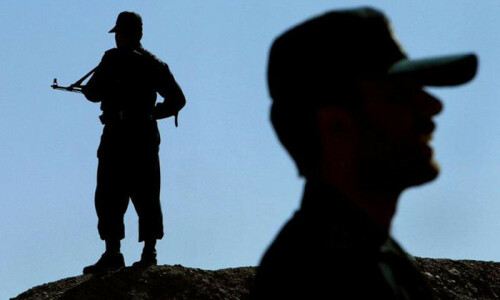KARACHI: Incidents of extrajudicial killings over blasphemy charges are increasing, with extremist groups gaining more influence in the country, especially in Sindh, while both the state and provincial governments appear unprepared to address the issue and hold violators accountable.
This was highlighted by rights activists at a session titled ‘Societal Resistance Against the Surge in Extremism and Radicalisation in Sindh’, organised at Szabist University on Wednesday.
Speaking on the occasion, Dr Riaz Shaikh, dean of the Faculty of Social Sciences at Szabist, expressed concern that acts of lynching and extrajudicial killings are on the rise, with extremist groups gaining control over various parts of the country, yet the state remains unresponsive to this problem.
“And the policemen who killed blasphemy suspect Dr Shahnawaz Kunbhar are still free. The state is not holding accountable those who take the law into their own hands. There’s a contradiction in the state’s policy regarding this issue,” he said.
Lament state inaction to prevent extremism from taking root
Rights activist Sadia Baloch said extremism gripped the country during the Afghan jihad and the US war on terror. As a result, many areas of the country were affected by extremist groups and now it reached Sindh.
“In the recent case of Dr Kunbhar, the state persecuted and tortured those protesting against his killing, instead of those responsible for his death,” she added.
Writer and poet Noorul Huda Shah criticised the Pakistan Peoples Party (PPP) government in Sindh, stating that the PPP relies on pirs (spiritual leaders) and landlords with fixed local vote banks, so it remains indifferent to the concerns of its general voter base. This reliance, she argued, makes the party unwilling to take action against lawbreakers.
“But ultimately, it is the government’s responsibility to control and put an end to this issue, as it has the power to do so,” she asserted.
Lawyer Rumasa Javed suggested that the judiciary has a crucial role to play in cases of extrajudicial killings over blasphemy allegations. She also raised concerns that youth in Sindh are being radicalised.
Sindh Human Rights Commission Chairperson Iqbal Detho suggested that accountability and rule of law are fundamental to democracy, and when these are neglected, incidents like Dr Kunbhar’s killing occur.
Rights activist and politician Shahnaz Wazir Ali expressed hope that despite the multiple crises the country faces, youth will bring about positive change.
Finally, the speakers at the programme, which was moderated by Shazia Nizamani, expressed their belief that despite these challenges, the people of Sindh and civil society will resist all forms of extremism and prevent them from taking root.
Published in Dawn, October 31st, 2024













































Dear visitor, the comments section is undergoing an overhaul and will return soon.